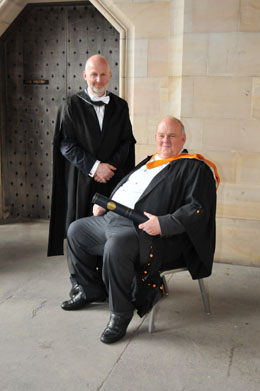Laureation address – Les Murray
Les Murray
Honorary Degree of Doctor of Letters
Laureation by Professor Don Paterson
School of English
Thursday 23 June 2011

Chancellor, it is my privilege to present Les Murray for the degree of Doctor of Letters, honoris causa.
The great American poet Robert Lowell was once invited to give a reading at an Ivy League university. In his introduction, the Dean warmly welcomed Lowell, assuring him he would feel at home as there were no less that ten other poets on the staff of the English faculty. With his customary tact, Lowell replied that he doubted there were ten poets alive on the entire planet. As Landor once remarked, “In poetry, there is a greater difference between the good and the excellent, than there is between the bad and the good. Poetry has no golden mean.” But because the distinction is sharp, poetry does have consensus: if you asked the world’s many good poets to write down the names of the five excellent ones, it is very likely Les Murray’s would be among them.
Les Murray was born in New South Wales in 1938, grew up in the district of Bunyah, and studied at the University of Sydney. He developed a strong interest in languages, and in the mid-1960s worked as a translator at the Australian National University. After a period of travel in Europe, Murray returned to Sydney, and in the early 1970s gave up what he described as his “respectable cover occupations” to embrace the disreputable art of poetry as a full-time career. In the 1980s, Murray returned to his family home in Bunyah, New South Wales, where he has lived since. Murray’s own family arrived in Sydney from Scotland in the mid-19th century, and In that culturally acquisitive way of ours, we have always regarded Murray as essentially a Scottish poet taking a leisurely route home; but he has always been a frequent visitor here, and proudly declares his Scottish heritage.
To call Murray’s literary output ‘rich and various’ is to give no impression of a poetry, as Derek Walcott described it, “so rooted in its sacredness, so broad-leafed in its pleasures”, nor communicate anything of its effortless fluency and almost casual innovation. However, one attribute we tend to think of as distinctly Murrayesque is ‘sprawl’. ‘Sprawl’ is something Murray himself identifies as strongly characteristic of the Australian aesthetic, a little like ‘louche’ on steroids, but with added intent – but it’s as indefinable and elusive a quality as Spanish duende, or Scots couthiness. ‘Sprawl,’ he says, ‘… is doing your farm work by aeroplane, roughly, / or driving a hitchhiker that extra hundred miles home … / … Sprawl occurs in art. The fifteenth to twenty-first / lines in a sonnet, for example. And in certain paintings. / I have sprawl enough to have forgotten which paintings.’
‘The long poem’ often has readers begging for less; but when Murray exercises his right to sprawl – one thinks especially of the verse-novels Fredy Neptune or The Boys Who Stole the Funeral – the results are always utterly compelling. However the reader swiftly realizes that such a fascinating, varied and vast landscape could not have been revealed to them unless Murray had first scaled the heights from which it might be apprehended. It is this commanding height that sets his work apart; and what has raised him there is his intellectual restlessness, his bold engagement with the controversies of faith and politics, his deep involvement with the land, and his readiness to speak up for all members of his ‘vernacular republic’ – especially the rural poor, the politically disenfranchised, and the socially marginalized.
To give just one remarkable example of Murray’s gift for ‘speaking up’: his collection Translations from the Natural World saw him take on the voices of many different animals, forging for each a unique syntax, a music, a pattern of thought. The results were too moving and profound to be dismissed as mere literary ventriloquism; instead, they demonstrated the most admirable talent our own species has – its ability to empathize with those unlike ourselves. This is the moral use of the imagination. And this, one feels, is the kind of writer Robert Lowell meant by ‘poet’.
Les Murray has been the recipient of many prizes and awards, the range of which give some indication of the international reach of his reputation: these include the Officer of the Order of Australia, the T. S. Eliot Prize, the Queen’s Gold Medal for Poetry, the Petrarch Prize in Germany and the Premio Mondello in Italy. It is particularly gratifying to add a Scottish honour to this exceptional tally.
Chancellor, in recognition of his remarkable contribution to the poetry of the English language, I invite you to confer on Les Murray the degree of Doctor of Letters, honoris causa.
Category Awards